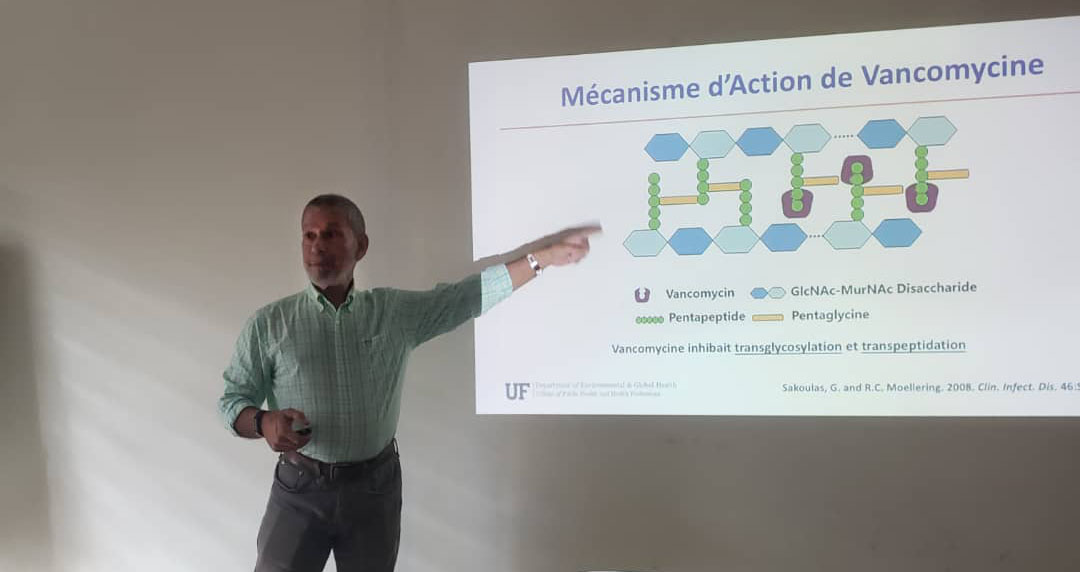Anthony Maurelli, Ph.D., speaks to trainees about antibiotic resistance during a three-week visit to the Institut Pasteur de Guinée in August and September. Photo courtesy of Anthony Maurelli.
Anthony Maurelli, Ph.D., a professor in the UF College of Public Health and Health Professions’ Department of Environmental and Global Health, recently traveled to Conakry, Guinea as a Fulbright Specialist to assist scientists at the Institut Pasteur de Guineé with research projects and training focused on antibiotic resistance and One Health.
The Fulbright Specialist Program sends U.S. faculty and professionals to serve as short-term expert consultants on curriculum, faculty development, institutional planning and related subjects at academic institutions abroad.
The Institut Pasteur de Guineé, or IPGui, is part of the greater Pasteur Network, a global alliance of 32 institutes dedicated to addressing public health challenges through research, innovation and collaboration. Maurelli was previously a postdoctoral fellow at the Institut Pasteur in Paris and has maintained connections with the global francophone scientific community — connections that eventually led to an invitation from IPGui Director Noël Tordo, Ph.D., to bring his expertise in antibiotic resistance to Conakry.
Maurelli, a member of the UF Emerging Pathogens Institute, has more than 40 years of research experience in molecular genetics of bacterial disease development and more than 30 years of continuous funding from the National Institutes of Health. In 2022, Maurelli was named one of the World’s Top 2% Scientists based on career-long impact, in a list created by Stanford University scientists.
He received a UF Faculty Enhancement Opportunity Award in 2023 to travel to west Africa and explore possibilities for research and partnerships and understand communities’ public health needs. Later, when IPGui received a financial award to support increased training around antibiotic resistance, Tordo reached out to Maurelli to join the project as a Fulbright Specialist.

From left: Alidehou Jerrold Agbankpe, Ph.D., director of the bacteriology unit at Institut Pasteur de Guinée; Anthony Maurelli, Ph.D.; and Noël Tordo, director of the Institut Pasteur de Guinée.
For three weeks in August and September, Maurelli worked with public health leaders on the ground in Guinea’s capital city to provide foundational training in basic science to a group of primarily lab technicians from the four major hospitals in Conakry and across more rural parts of the country.
IPGui is the youngest of the institutes, established in 2015 to address the Ebola epidemic. After a decade of focusing on Ebola and other endemic viruses such as Lassa fever, Marburg, chikungunya, Zika and dengue, the institute is now building up its bacteriology program. Diphtheria and pertussis, also known as whooping cough, are of critical interest, Maurelli said, along with waterborne and foodborne illnesses such as Campylobacter, E. coli and Shigella.
Many bacterial and viral infections present with similar symptoms, and without testing to determine the pathogen causing those symptoms, clinicians can’t prescribe targeted treatments. Instead, patients are frequently treated with broad-spectrum antibiotics regardless of the underlying cause, leading to antibiotic resistance. Some of the most virulent bacterial strains adapt to new drugs almost as soon as they’re developed.
“It’s an arms race,” Maurelli said.

